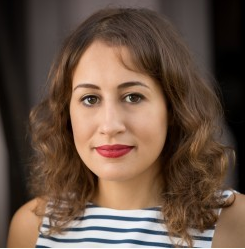
By Hannah Flaum
In Tunisia today, “women can wear bikinis and drink beer, but they can also go to the mosque and wear veils.” That’s the kind of women rights that Amira Yahyaoui, the Tunisian 2014 Yale World Fellow, advocates for.
Tunisia is much more progressive in its stance on gender equality and women’s rights than neighboring Arab states. Some of that can be attributed to people like Yahyaoui, a prominent human rights advocate in Tunisia who helped write many of the articles in the new Tunisian constitution after the Arab Spring. It’s those constitutional articles that focus on gender that Yahyaoui remains the proudest of. To her, women’s rights means equal respect and access to opportunities for women and men. That means that not only is there an article that guarantees gender equality, but there’s also an article that requires the ballot of any party to be 50% female. Yahyaoui noted that this article ensures not only that women will always be represented in government, but also that all parties will actively recruit women, educate women, and promote the success of women in politics. Women now represent 31% of Tunisia’s newly elected Parliament. For comparisons’ sake, women represent only 19% of the US Congress and House of Representatives.

Perhaps that’s why Yahyaoui is so critical of the United States. According to her, new democracies cannot simply follow the examples of supposedly “exemplary” democracies. The small percentage of women in government in such an established and powerful democracy, in addition to the racial issues that persist in the American prison system and the lack of access to water within the US (in addition to other issues) are all critical problems that make the US less credible as a model democracy.
Instead, Yahyaoui is charting a different approach to democracy in her homeland. She is the founder and head of an NGO, Al Baswala, which monitors the Tunisian Parliament, Constitutional Assembly, and city halls and makes its data available to the Tunisian public to foster openness between the new government and its people. A critical feature of Al Baswala’s website gives Tunisian citizens the ability to post questions for its parliamentarians. So far, Al Baswala has managed to maintain a 100% response rate from parliamentarians. It posts the answers online for all readers to access. The main purpose of this effort, Yahyaoui explained, is to educate Tunisian citizens who have previously lived under a corrupt dictatorship as to why their new government is important in their own daily lives. Yahyaoui argued that while the heads of government have been reformed, the public has not and this is what her NGO is working toward changing. Although Tunisia is perhaps the only success story after the Arab Spring, the functioning and legitimacy of the current democracy does not necessarily ensure that corruption cannot take hold again.
Hannah Flaum is a senior in Ezra Stiles College. She can be contacted at hannah.flaum@yale.edu